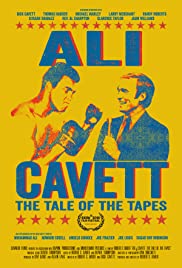
ALI & CAVETT: THE TALE OF THE TAPES
US, 2018, 95 minutes, Colour.
Directed by Robert S.Bader.
This is a documentary for fans of Muhammad Ali. Those were not his fans or who do not know much about him will find the documentary intriguing and, concerning Ali himself, revelatory.
The film was prepared by television host, Dick Cavett, popular in the 1960s and into the 1970s on American evening television. Cavett, in his 80s, has collaborated in the writing and preparation of the clips with his longtime collaborator, Robert S. Bader.
Dick Cavett, appearing very youthful in the clips – and, much older in the accompanying interviews from the present, connected well with Muhammad Ali. Ali appeared frequently on his show, quite a lot of banter, a lot of information, a lot of commentary and criticism, especially in his crisis about the call up for the Vietnam war and his being banned from boxing for three years in the prime of his boxing life.
There are quite a number of clips, more than might be expected, of Ali, talking about his rather middle-class upbringing in Louisville, Kentucky, his parents, his education, his boxing talent – leading him to win gold at the Rome Olympics in 1960. There is an outline of his bouts before that in the lead up to his Olympic presence, with Sonny Liston, and then his defending his world championship during the first part of the 1960s.
There is also a great deal about his interest in Islam, the contact with Elijah Muhammad and Cassius Clay changing his name to Muhammad Ali. There are also his contacts with Malcolm X. Both of these Muslim leaders are featured in clips during the film.
There are also interviews with quite a number of celebrities and observers at the time, including his longtime trainer, Angelo Dundee – and the comment that his entourage, trainer, manager, publicist rule white.
Particularly interesting and the numerous comments and observations by Rev Al Sharpton, Louis Farrakhan, along with appearances by Norman Mailer, Sugar Ray Robinson,, Howard Cosell and various biographers and sportswriters.
Which means then that in the early 1960s, and with some witness from Martin Luther King, the film highlights Ali’s dilemmas, his personal beliefs, his encounters with Elijah Muhammad, the role of the Nation of Islam, falling out with him, the assassination of Malcolm X.
This also material on his stances about the Vietnam war, his conscientious objection, is claiming to be a minister of the Nation of Islam, the court appearances, the Supreme Court and its decisions.
His rival, Joe Frazier, also appears a number of times with Dick Cavett and some entertaining rivalry between the two as well as some serious differences of opinion. There is reference to Zaire and the Rumble in the Jungle with George Foreman but not such an emphasis on it.
Ali himself appeared in films, including The Greatest. And he was impersonated by Will Smith very effectively in Michael Mann’s feature film, Ali.